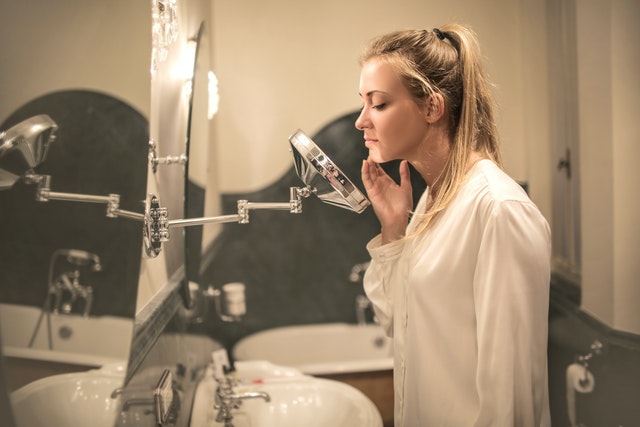It’s important to keep in mind that several factors contribute to acne and the right acne treatment varies based on: 1
– the type of acne
– the location
– the timing of the breakouts
– the age of the person
What are good habits to adopt against acne?
To start off there are some good habits to take care of the skin. The American Academy of Dermatology Association recommends these 10 acne-friendly skin care habits to help optimizing skin results:1
1. Wash the skin twice daily. Additionally, wash the skin as soon as possible after sweating
2. Avoid using anything that can irritate the skin (washcloth, mesh sponge). Instead use the fingertips to apply a gentle non-abrasive cleanser
3. Use gentle products on the skin and avoid harsh products that may dry and irritate the skin
4. Avoid scrubbing
5. Rinse with lukewarm water
6. Shampoo regularly especially if you have oily hair
7. Let the skin heal naturally to avoid the risk of acne scars
8. Keep your hands off your face throughout the day to avoid flair-ups
9. Avoid the sun and tanning beds to protect against skin damage. Additionally, acne medications often make the skin more sensitive to UV light.
10. Consult a dermatologist to treat existing acne, prevent new breakouts, and treat scars and dark spots
It is suggested that reducing stress can help preventing flare ups.
There are various natural treatments and home remedies commonly recommended for acne.
What foods are natural treatment for acne?
A low glycemic diet could help in promoting clear skin. Low glycemic diets are rich in fresh fruits and vegetables, legumes, and steel cut oats.1 These types of diets prevent two acne contributors: inflammation and increased sebum production by preventing blood sugar spikes.1 Several small studies from the USA, Australia, Korea and Turkey have found:
– an association between low-glycemic diets and lower amount of acne1
– an association between high-glycemic diets and higher amount of acne1
Additionally, a low-glycemic intake combined with a probiotic-rich diet has been suggested has beneficial in preventing breakouts.2
Vitamins that are beneficial:
- Vitamins A, C, D, E, and B are beneficial against acne.2
- Vitamin A has regenerative properties and protective effect that could benefit the skin.2
- Vitamin C has anti-inflammatory, antioxidant, healing and anti-hyperpigmentation properties.2
- Vitamin D has a preventative potential against sebum secretion, clogged pores and bacterial growth.2
- Vitamin E has strong anti-inflammatory, antioxidant, anti-seborrheic properties.2
- Vitamin B has antibacterial properties and a preventive potential against sebum secretion.2
Avoiding cow’s milk may also help in preventing breakouts.3 Even though the exact mechanism linking cow milk to an increased risk of breakouts is not yet well understood.1 On the other hand, there is no evidence supporting the fact that other dairy products such as yogurt or cheese can increase acne.1
Minerals
Minerals rich diets can help treat acne by combating inflammatory lesions.2
It has been shown that people who suffer from acne have reduced zinc serum levels.4 Zinc has bacteriostatic properties and anti-inflammatory.2 Zinc supplementation can be used as an effective natural treatment for acne to help reducing inflammation.4 Selenium has anti-inflammatory properties and regulates sebum production.2
Additionally, combination of vitamin E, zinc, and lactoferrin, a whey milk protein, in the diet has been found to benefit against acne.2
What is a natural topical treatment for acne?
Green tea extract
Green tea extract has anti-inflammatory and antioxidant properties that may be effective against mild-to-moderate acne.5 Despite some challenges with penetrating the skin, topical application might be more effective than oral intake.5,6
Aloe vera
Aloe vera has been suggested as an adjuvant acne treatment for its anti- inflammatory, anti-pruritic, antibacterial, and healing properties.5 A recent systematic review found that aloe vera gel showed statistically significant reduction of non-inflammatory, inflammatory, and total acne lesions.5
Tea tree oil
Tea tree oil is an essential oil with broad spectrum antimicrobial activity and anti- inflammatory properties.5 For these properties it has been suggested as a spot treatment for acne.5
What are commonly used natural treatments for acne that might be more harmful?
Apple cider vinegar is commonly used as a home remedy against skin problems. It contains several organic acids with antimicrobial and antioxidant properties that might help against acne and acne scarring.7 However, it can be more harmful and damage the skin when misused or used inappropriately.7
Honey has antibacterial and anti- inflammatory therapeutic properties, a potential to promote wound healing and tissue regeneration.5 Additionally, it has the ability to help minimizing scar size.5 However, despite its application showed some minor improvements against acne, it has also been reported of worsening acne.5 In general, dermatologists recommend avoiding comedogenic products that might clog pores and therefore increase breakout risk.1
References
1. https://www.aad.org/public/diseases/acne
2. Podgórska, A., Puścion-Jakubik, A., Markiewicz-Żukowska, R., Gromkowska-Kępka, K. J., & Socha, K. (2021). Acne Vulgaris and Intake of Selected Dietary Nutrients-A Summary of Information. Healthcare (Basel, Switzerland), 9(6), 668. https://doi.org/10.3390/healthcare9060668
3. Adebamowo CA, Spiegelman D, et al. “High school dietary dairy intake and teenage acne.” J Am Acad Dermatol. 2005;52(2):207-14.
4. Yee, B. E., Richards, P., Sui, J. Y., & Marsch, A. F. (2020). Serum zinc levels and efficacy of zinc treatment in acne vulgaris: A systematic review and meta-analysis. Dermatologic therapy, 33(6), e14252. https://doi.org/10.1111/dth.14252
5. Jones, V. A., Patel, P. M., Wilson, C., Wang, H., & Ashack, K. A. (2020). Complementary and alternative medicine treatments for common skin diseases: A systematic review and meta-analysis. JAAD international, 2, 76–93. https://doi.org/10.1016/j.jdin.2020.11.001
6. Kim, S., Park, T. H., Kim, W. I., Park, S., Kim, J. H., & Cho, M. K. (2021). The effects of green tea on acne vulgaris: A systematic review and meta-analysis of randomized clinical trials. Phytotherapy research : PTR, 35(1), 374–383. https://doi.org/10.1002/ptr.6809
7. Elhage, K. G., St Claire, K., & Daveluy, S. (2021). Acetic acid and the skin: a review of vinegar in dermatology. International journal of dermatology, 10.1111/ijd.15804. Advance online publication. https://doi.org/10.1111/ijd.15804
Photo by Andrea Piacquadio at Pexels



